As cool as I think this is, I also think it's a little 'brave new world.' I don't like the idea of someone telling me how much cannabis I need for my usage. And prescribing it to me in a concentrated form from a device which also communicates my usage to the provider.
I'm also a little surprised at how strict the Israeli government is about who can use cannabis considering how advanced their research on it is there.
FIRST-EVER ISRAELI INHALER TRANSFORMING MARIJUANA INTO PRESCRIBED DOSES
BY MAX SCHINDLER OCTOBER 15, 2017
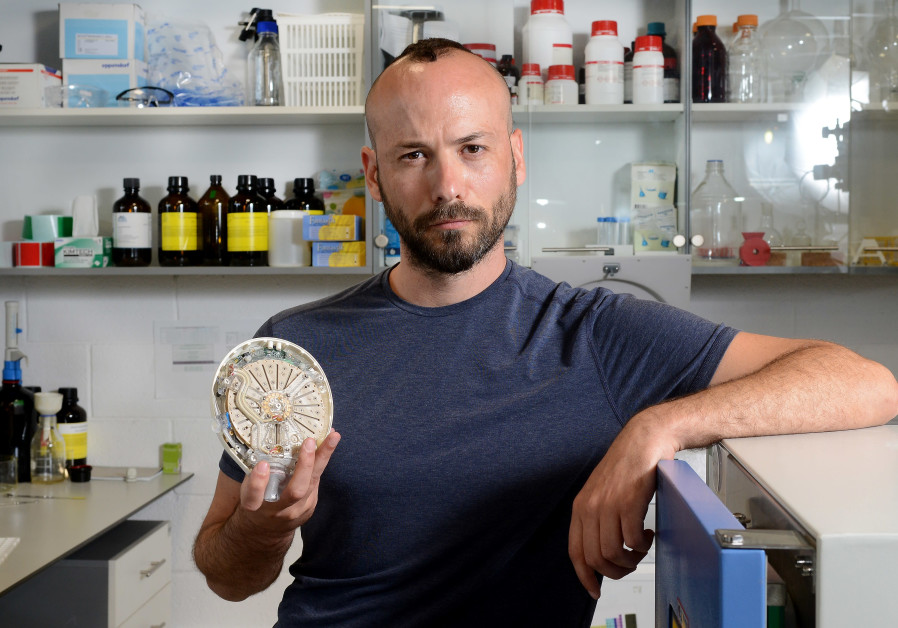
CEO of Syqe Medical, Israel's leading medical marijuana firm, poses in his office alongside the company's 3D-printed inhaler.. (photo credit:COURTESY/SYQE MEDICAL)
Before Israel licensed medical marijuana, people with terminal illnesses would come desperately to a young, chin-bearded grower named Perry Davidson.
“Back then, I was picking up the cannabis in the garden, going on the bus, wrapping it up so it didn’t smell and physically giving it to the patient,” said Davidson, CEO of Syqe Medical, a drug delivery company. “I was a 26-yearold schmuck, and I was dealing with hundreds of cancer patients... How did we get to a situation where if I didn’t wake up in the morning, these cancer patients would or wouldn’t get their medication?” Today, giant pharmaceutical giants such as Teva Pharmaceuticals have partnered with Tel Aviv-based start-up Syqe Medical to market and distribute a new, 3D-printed, medical marijuana inhaler that allows doctors to prescribe the drug remotely and in controlled doses
The device – built on-site in a 3D-printer shown to The Jerusalem Post – is the only metereddose cannabis and plant-material medicinal inhaler in the world that Davidson and Syqe Medical chairman Eytan Hyam know of. It was approved by the Health Ministry more than two years ago for use in a pilot program at Rambam Hospital in Haifa, the first site where doctors prescribe the drug as “standard medical treatment.”
Israel has long taken medical marijuana seriously, ever since pioneering Prof. Raphael Mechoulam, who was then at Weizmann Institute of Science in Rehovot, became the first person to identity the plant’s main psychoactive compound, THC (tetrahydrocannabinol), in the 1960s. “The start-up nation vibe” has also helped Syqe Medical, its CEO said. The company has benefited from a half-million-dollar 3D printer it got for free as a beta product, along with $1 million of funding from the Israel Innovation Authority in its early stages.
“The R&D, localized support, it has very much to do with the innovative climate in Israel and the financial support of seed investors... Now, investors are knocking at our doors every day,” Davidson said.
Administering cannabis to patients has long frustrated doctors due to the lack of a precise dosage and because many users smoke the drug, inhaling carcinogens in the process. Syqe’s inhaler overcomes those health concerns.
After inhaling, it takes between three to five minutes for the concentrated cannabis to reach maximum blood levels, unlike modified marijuana liquid extractions or oils which require hours to take effect. And as a smart device, the inhaler transmits usage data immediately back to Syqe, allowing researchers to track usage and provide case studies to other jurisdictions that are on the fence about legalizing the drug.
The handheld device includes dozens of preloaded marijuana VaporChips – similar in shape and size to a computer chip – that are housed in a single cartridge. The inhaler includes thermal controllers and lung interfacing that can pause or increase airflow based on pace and speed. That allows the inhaled dose to meet a level of precision within one hundred micrograms – a medically acceptable threshold of accuracy.
“We are able to deliver a plant with the same rigor, safety and precision as a [traditional] pharmaceutical,” Davidson said. He pointed to a 2016 agreement with Teva Pharmaceuticals to distribute Syqe’s inhaler domestically.
The company plans to start a trial with the US Food and Drug Administration next year.
“We give them credit, for Teva, to have the chutzpah to sign up with us to prescribe cannabis in its natural form,” Davidson said. “The fact that we had to go through all the due diligence with the top management in Teva to have this marketed by a pharmaceutical company – if that doesn’t mean we’re a drug, I don’t know what is a drug.”
Even Philip Morris, the American tobacco giant, has invested $20m. in Syqe to look at how to reduce the harm from smoking its nicotine products. To date, Syqe has raised some $33m.
Of the estimated 30,000 Israelis who are prescribed medical marijuana, several hundred are using the Syqe device, all of them under the auspices of Rambam Hospital. The Knesset is currently considering legislation to allow medical marijuana to be exported, which could be a boon to the overall industry and to Syqe.
“There are people calling us once or twice a week, asking, ‘Is it in the market, is it in the market?’” Davidson said. The inhaler will be distributed sometime in 2018 for use outside the hospital environment.
Patients in Israel can get a prescription for medical marijuana if their condition did not improve after trying traditional drugs within the past year. Unlike California’s notoriously lax rules governing medical marijuana, where complaints of a backache can cajole a doctor into writing a prescription, Israel restricts the drug far more strictly.
Treatment with marijuana is available for, among others, patients with chronic neuropathic pain, those with a diagnosis of multiple sclerosis and individuals undergoing chemotherapy.
I'm also a little surprised at how strict the Israeli government is about who can use cannabis considering how advanced their research on it is there.
FIRST-EVER ISRAELI INHALER TRANSFORMING MARIJUANA INTO PRESCRIBED DOSES
BY MAX SCHINDLER OCTOBER 15, 2017
CEO of Syqe Medical, Israel's leading medical marijuana firm, poses in his office alongside the company's 3D-printed inhaler.. (photo credit:COURTESY/SYQE MEDICAL)
Before Israel licensed medical marijuana, people with terminal illnesses would come desperately to a young, chin-bearded grower named Perry Davidson.
“Back then, I was picking up the cannabis in the garden, going on the bus, wrapping it up so it didn’t smell and physically giving it to the patient,” said Davidson, CEO of Syqe Medical, a drug delivery company. “I was a 26-yearold schmuck, and I was dealing with hundreds of cancer patients... How did we get to a situation where if I didn’t wake up in the morning, these cancer patients would or wouldn’t get their medication?” Today, giant pharmaceutical giants such as Teva Pharmaceuticals have partnered with Tel Aviv-based start-up Syqe Medical to market and distribute a new, 3D-printed, medical marijuana inhaler that allows doctors to prescribe the drug remotely and in controlled doses
The device – built on-site in a 3D-printer shown to The Jerusalem Post – is the only metereddose cannabis and plant-material medicinal inhaler in the world that Davidson and Syqe Medical chairman Eytan Hyam know of. It was approved by the Health Ministry more than two years ago for use in a pilot program at Rambam Hospital in Haifa, the first site where doctors prescribe the drug as “standard medical treatment.”
Israel has long taken medical marijuana seriously, ever since pioneering Prof. Raphael Mechoulam, who was then at Weizmann Institute of Science in Rehovot, became the first person to identity the plant’s main psychoactive compound, THC (tetrahydrocannabinol), in the 1960s. “The start-up nation vibe” has also helped Syqe Medical, its CEO said. The company has benefited from a half-million-dollar 3D printer it got for free as a beta product, along with $1 million of funding from the Israel Innovation Authority in its early stages.
“The R&D, localized support, it has very much to do with the innovative climate in Israel and the financial support of seed investors... Now, investors are knocking at our doors every day,” Davidson said.
Administering cannabis to patients has long frustrated doctors due to the lack of a precise dosage and because many users smoke the drug, inhaling carcinogens in the process. Syqe’s inhaler overcomes those health concerns.
After inhaling, it takes between three to five minutes for the concentrated cannabis to reach maximum blood levels, unlike modified marijuana liquid extractions or oils which require hours to take effect. And as a smart device, the inhaler transmits usage data immediately back to Syqe, allowing researchers to track usage and provide case studies to other jurisdictions that are on the fence about legalizing the drug.
The handheld device includes dozens of preloaded marijuana VaporChips – similar in shape and size to a computer chip – that are housed in a single cartridge. The inhaler includes thermal controllers and lung interfacing that can pause or increase airflow based on pace and speed. That allows the inhaled dose to meet a level of precision within one hundred micrograms – a medically acceptable threshold of accuracy.
“We are able to deliver a plant with the same rigor, safety and precision as a [traditional] pharmaceutical,” Davidson said. He pointed to a 2016 agreement with Teva Pharmaceuticals to distribute Syqe’s inhaler domestically.
The company plans to start a trial with the US Food and Drug Administration next year.
“We give them credit, for Teva, to have the chutzpah to sign up with us to prescribe cannabis in its natural form,” Davidson said. “The fact that we had to go through all the due diligence with the top management in Teva to have this marketed by a pharmaceutical company – if that doesn’t mean we’re a drug, I don’t know what is a drug.”
Even Philip Morris, the American tobacco giant, has invested $20m. in Syqe to look at how to reduce the harm from smoking its nicotine products. To date, Syqe has raised some $33m.
Of the estimated 30,000 Israelis who are prescribed medical marijuana, several hundred are using the Syqe device, all of them under the auspices of Rambam Hospital. The Knesset is currently considering legislation to allow medical marijuana to be exported, which could be a boon to the overall industry and to Syqe.
“There are people calling us once or twice a week, asking, ‘Is it in the market, is it in the market?’” Davidson said. The inhaler will be distributed sometime in 2018 for use outside the hospital environment.
Patients in Israel can get a prescription for medical marijuana if their condition did not improve after trying traditional drugs within the past year. Unlike California’s notoriously lax rules governing medical marijuana, where complaints of a backache can cajole a doctor into writing a prescription, Israel restricts the drug far more strictly.
Treatment with marijuana is available for, among others, patients with chronic neuropathic pain, those with a diagnosis of multiple sclerosis and individuals undergoing chemotherapy.
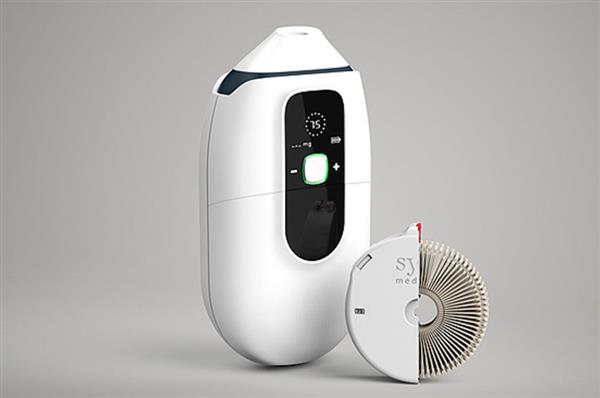
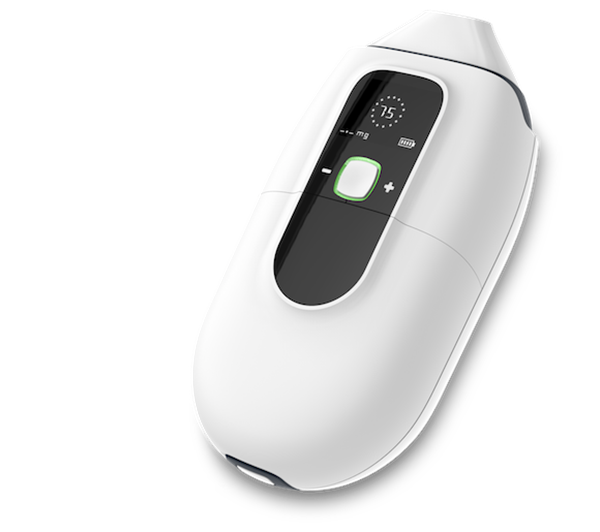
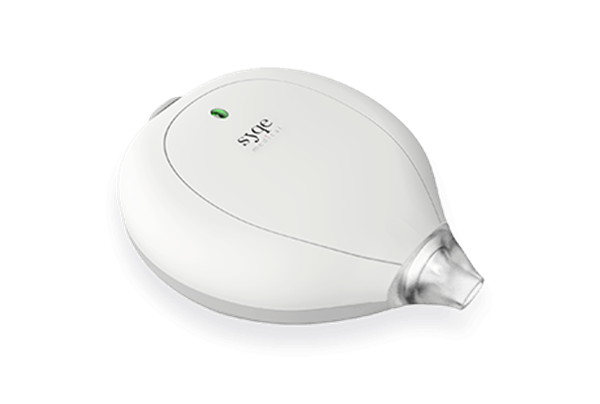
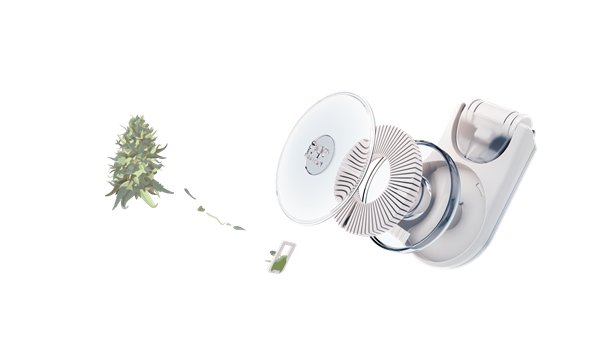

 Fixed.
Fixed.